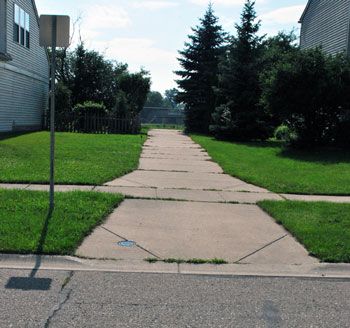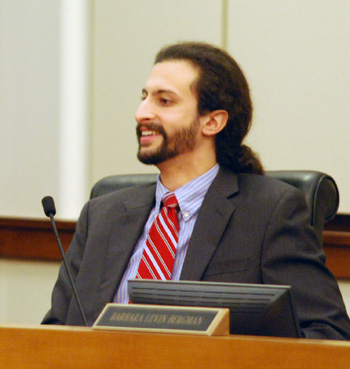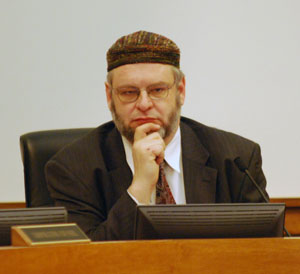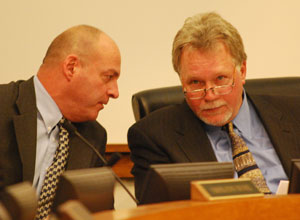Sidewalk Issue Paused, Video Law Stopped
Ann Arbor city council meeting (July 1, 2013): In a meeting that featured land use and planning as a main theme, the council chose to put off final decisions on two significant issues.

A cross-lot path that leads from Roon the Ben in the Turnberry neighborhood to the ballfields for Scarlett-Mitchell schools. A pending ordinance change could eventually place responsibility for capital repairs on the city, but give adjacent property owners the responsibility of shoveling snow. (Photos by the writer.)
First, councilmembers postponed a decision on a change to the definition of “sidewalk” in the city code – which would have implications for the adjacent property owners of “cross-lot paths.” While the definitional change would allow the city to take responsibility for capital repairs on such cross-lot paths – using sidewalk repair millage funds – it would place the burden of winter snow shoveling on adjacent property owners.
That division of responsibility for repair and maintenance is one that’s now familiar to owners of property adjacent to sidewalks that run next to a road or a street. Given the number of open questions about how logistics would actually work, and concerns expressed during the public hearing on July 1 as well as at a previous public meeting on the topic, the council decided to postpone a final vote until Oct. 7, 2013.
Second, the council postponed a vote on adding the South State Street corridor plan to the city’s master plan, which consists of several separate documents. The city planning commission has already voted to adopt the corridor plan as part of the master plan. It’s one of the few issues on which the planning commission does not act just as an advisory body that makes recommendations to the council. For the master plan, the council and the planning commission must adopt the same plan. The postponement came in deference to a request from Marcia Higgins (Ward 4). The area of the study lies in Ward 4, which she represents.
Despite the postponement, the South State Street corridor plan still had an impact on a decision made by the council – to deny a rezoning request for the parcel at 2271 S. State St. The change in zoning would have allowed the parcel to be used for car sales. That use isn’t consistent with the recommendations in the corridor plan, and the planning commission had recommended against rezoning on that basis. Even though it was just the initial vote on the rezoning – an occasion when councilmembers sometimes will advance an ordinance change to a second reading in order to allow a public hearing to take place – the rezoning request got no support on the council.
In contrast, the initial rezoning requested for the Kerrytown Place project – an 18-unit townhouse development at the location of the former Greek Orthodox church on North Main Street – received unanimous approval at the council’s July 1 meeting.
Also related to land use, the council reconstituted a 12-member citizens advisory committee to study the R4C zoning area. The re-establishment of the group, which was originally appointed in 2009, comes after the planning commission had voted at its April 16, 2013 meeting to send recommendations to the city council for revisions to the R4C zoning areas. The recommended revisions were not the actual ordinance language. That language would need to be written after councilmembers sign off on the general recommendations. No action is expected by the council until the committee has met two or three times.
Another committee reconstituted by the council on July 1 was a group to sort through some contentious issues between the council and the Ann Arbor Downtown Development Authority. The council has postponed until Sept. 3 a final decision on a change to Chapter 7 of the city code, which regulates the DDA’s tax increment finance (TIF) capture. The four councilmembers on the committee are: Christopher Taylor (Ward 3), Stephen Kunselman (Ward 3), Sally Petersen (Ward 2) and Jane Lumm (Ward 2). Two days later, at its regular monthly meeting, the DDA’s complement was appointed: Roger Hewitt, Bob Guenzel, Joan Lowenstein and Sandi Smith.
A proposed video privacy ordinance that was on the council’s July 1 agenda did not win sufficient support to advance to a second reading. The proposal would have regulated the way that public surveillance cameras could be used by local law enforcement officials. Although the vote was 5-4 in favor, that fell short of the six-vote majority it needed on the 11-member body. So the council voted down the video privacy ordinance on its initial consideration – having postponed the issue several times previously.
The council also decided to delay adoption of amendments to its own internal rules – out of deference to two councilmembers who were absent from the meeting: Sally Petersen (Ward 2) and Margie Teall (Ward 4). Highlights of the rule changes include the addition of a public commentary opportunity at council work sessions, and reduction in the time per turn for the public from three to two minutes. A change in councilmember speaking times equates to a reduction from eight minutes to five minutes total per item for each councilmember.
The council handled a number of other items during the meeting, including the adoption of the 2009 International Fire Code, a location change for the Ward 2 Precinct 8 polling place, approval of a special assessment to help pay for sidewalk and curb improvements along Miller Avenue, and confirmation of appointments to boards and commissions. [Full Story]






